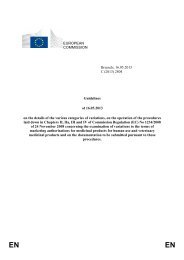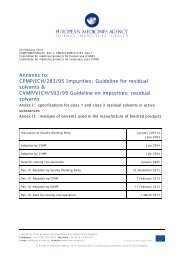PHARMACY
eip26-sep15
eip26-sep15
- No tags were found...
Create successful ePaper yourself
Turn your PDF publications into a flip-book with our unique Google optimized e-Paper software.
egulatory review<br />
The current review period has<br />
seen a number of changes in<br />
the regulation of medicines<br />
and regulatory guidance in<br />
the EU, International markets<br />
and the USA. Incidents are<br />
reported of medicines being<br />
suspended in the EU because<br />
of flawed studies and also of<br />
companies being fined for<br />
serious breaches of good<br />
manufacturing practice<br />
(GMP) in the manufacture<br />
and supply of products in the<br />
UK.<br />
USA<br />
Request for Quality Metrics<br />
This draft guidance includes an<br />
explanation of how the Food and<br />
Drug Administration (FDA) intends<br />
to collect data and use quality<br />
metrics to help ensure that their<br />
policies and practices continue to<br />
support continuous improvement<br />
and innovation in the pharmaceutical<br />
manufacturing industry.<br />
These metrics can be used by the<br />
FDA: to help develop compliance<br />
and inspection policies and<br />
practices, such as risk-based<br />
inspection scheduling of drug<br />
manufacturers; to improve the<br />
Agency’s ability to predict and,<br />
therefore, possibly mitigate, future<br />
drug shortages; and to encourage<br />
the pharmaceutical industry to<br />
implement state-of-the-art,<br />
innovative quality management<br />
systems for pharmaceutical<br />
manufacturing.<br />
Assessment and Control of<br />
DNA Reactive (Mutagenic)<br />
Impurities in Pharmaceuticals<br />
As a result of chemical synthesis or<br />
subsequent degradation, impurities<br />
reside in all drug substances/drug<br />
products. International Conference<br />
on Harmonisation (ICH) Q3A and<br />
Q3B provide guidance for<br />
qualification and control for the<br />
majority of the impurities. Limited<br />
guidance is provided, however, for<br />
those impurities that are DNA<br />
reactive. This guidance provides a<br />
practical (safety and quality risk<br />
management) framework that is<br />
applicable to the identification,<br />
categorisation, qualification and<br />
control of mutagenic impurities to<br />
limit potential carcinogenic risk from<br />
mutagenic impurities that reside or<br />
are reasonably expected to reside in<br />
final drug substance or product,<br />
taking into consideration the<br />
intended conditions of human use.<br />
Reportable CMC Changes for<br />
Approved Drug and Biologic<br />
Products<br />
This draft guidance addresses the<br />
lack of clarity with respect to what<br />
chemistry, manufacturing, and<br />
controls (CMC) information in a<br />
marketing application constitutes an<br />
established condition or a<br />
“regulatory commitment” that, if<br />
changed following approval,<br />
requires reporting to the FDA. Such<br />
clarification, should lead to a better<br />
understanding that certain CMC<br />
changes can be made solely under<br />
the Pharmaceutical Quality System<br />
without the need to report to the<br />
FDA. The result should be a more<br />
effective post-approval submission<br />
strategy over the lifecycle of the<br />
product by the regulated industry.<br />
Size, Shape, and Other<br />
Physical Attributes of Generic<br />
Tablets and Capsules<br />
Generic drug products are required<br />
to be both pharmaceutically and<br />
therapeutically equivalent to a<br />
reference listed drug (RLD). The<br />
FDA is also concerned that<br />
differences in physical characteristics<br />
(e.g. size and shape of the tablet or<br />
capsule) may affect patient<br />
compliance and acceptability of<br />
medication regimens or could lead<br />
to medication errors. The FDA<br />
recommends that generic drug<br />
manufacturers consider physical<br />
attributes when they develop quality<br />
target product profiles for their<br />
generic product candidates.<br />
Europe<br />
Concept paper on new<br />
guidance for importers of<br />
medicinal products<br />
The GMP/GDP [good distribution<br />
practice] Implementation Working<br />
Group agreed to draft a specific<br />
guidance for import authorisation<br />
holders. This document most likely<br />
would take the form of a new annex<br />
(annex 21). The scope of the project<br />
will focus on importation activities<br />
not addressed in detail in the<br />
current GMP guide and annexes.<br />
Fast track routes for medicines<br />
that address unmet medical<br />
needs<br />
The European Medicines Agency<br />
(EMA) has revised its guidelines on<br />
the implementation of accelerated<br />
assessment and conditional<br />
marketing authorisation, two key<br />
tools in European legislation to<br />
accelerate patients’ access to<br />
medicines that address unmet<br />
medical needs.<br />
EMA confirms<br />
recommendation to suspend<br />
medicines over flawed studies<br />
The EMA originally suspended a<br />
number of medicines for which<br />
authorisation in the EU was primarily<br />
based on clinical studies conducted<br />
at GVK Biosciences in Hyderabad,<br />
India. Following a re-examination<br />
requested by marketing<br />
authorisation holders for seven of<br />
the medicines concerned. Around<br />
700 pharmaceutical forms and<br />
strengths of medicines studied at<br />
the Hyderabad site remain<br />
recommended for suspension. For<br />
around 300 other pharmaceutical<br />
forms and strengths, sufficient<br />
supporting data from other sources<br />
had been provided; these medicines<br />
will therefore remain on the market<br />
in the EU.<br />
Medicines and Healthcare<br />
Products Regulatory Agency<br />
(MHRA)<br />
Companies sentenced for<br />
supplying hospitals with<br />
defective pre-filled syringes<br />
A major healthcare company and a<br />
sister company that sold a range of<br />
ready-to-use pharmaceutical<br />
products it manufactured have been<br />
sentenced for supplying hospitals<br />
with defective pre-filled syringes<br />
that in one case contributed to the<br />
22 european INDUSTRIAL <strong>PHARMACY</strong> September 2015 • Issue 26





